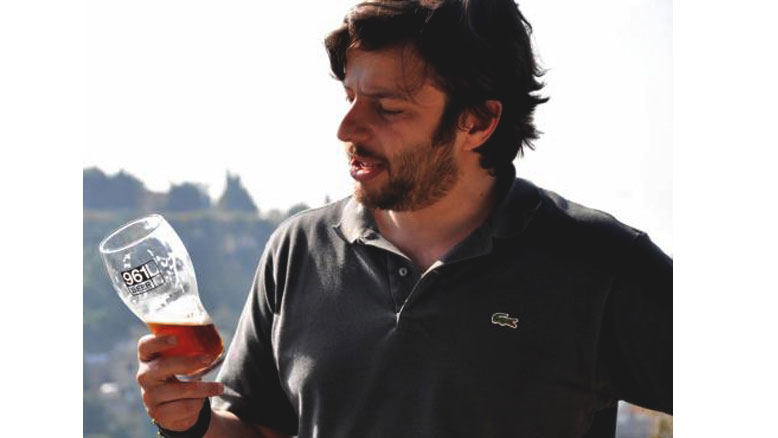FACES OF THE ECONOMY: Mazen Hajjar
Faces of Economy – Lebanon
FACES OF THE ECONOMY: Mazen Hajjar
There are 1.4 million workers in Lebanon – this is the story of one of them.
In July 2006, as Israel was unleashing a wave of bombs onto Lebanon, Mazen Hajjar received a phone call from his business partner asking him if he had registered the beer brewing company they had thought up.

FACES OF THE ECONOMY: Mazen Hajjar
There are 1.4 million workers in Lebanon – this is the story of one of them.
By Justin Salhani
BEIRUT, Lebanon – In July 2006, as Israel was unleashing a wave of bombs onto Lebanon, Mazen Hajjar received a phone call from his business partner asking him if he had registered the beer brewing company they had thought up.
Looking at the state of the nation, Hajjar despondently apologized to Henrick Haagen, a Dane, and said he would send back his investment money, effectively ending their dream of brewing beer.
But Henrick wasn’t deterred. “He told me to just register it and that it was a great story,” said Hajjar, speaking at a pub in Beirut in between drinks of 961’s draft Indian Pale Ale, Hajjar’s latest concoction. The bottle of IPA is decorated by an American flag design.

More than seven years later, 961 Beer is now Lebanon’s only craft beer and also the only domestic alternative to Almaza, owned by Heineken. Based out of the factory in Mazraa Yachoua, Hajjar is the CEO and founder of 961 Beer. Last year, they brewed around 200,000 cases of beer and exported to 19 countries.
“Neither Henrick nor I ever entered a brewery before,” said Hajjar. “I didn’t fit into stereotype of the typical entrepreneur.”
Hajjar, 39, rewinds back to 2005. On his way to fix a broken window, he ran into Haagen, wandering aimlessly around Beirut’s Monot neighborhood. They began chatting and ended up spending the next five days hanging out. On their last evening together, Hajjar says he was asked by Hagen what he really wanted to do with his life. Hajjar responded that he wanted to make beer.
“I had had enough of drinking light fizzy lagers,” said Hajjar, who before 961 worked a collection of jobs in widely varying fields.
Hagen loved Hajjar’s idea and spent most of 2005 and 2006 bringing hops and barley into Lebanon, which made for interesting encounters with airport security.
“That day I started making beer in my kitchen with friends,” he said. On Sunday, Hajjar would hold “research sessions” where they would try whatever beer was made. Eventually, the crowd became too big for Hajjar’s house so the business partners bought Canadian equipment to put together a brewery.
Three days before the start of the July 2006 war, Henrick and Hajjar decided to start their company. After receiving Henrick’s phone call, Hajjar says he opened Steve Hindy’s autobiography. Hindy was the man behind the reputable New York based beer maker, Brooklyn Brewery.
“In the first sentence on the first page of the book I saw a line about waking up to the sounds of bombs exploding in Hotel Alexandre in Beirut,” said Hajjar. Hindy covered the Lebanese Civil War for the Associated Press and the similar situation that Hajjar was experiencing at the time gave him the needed inspiration to carry on with his goal.
“That day I started making beer in my kitchen with friends,” he said. On Sunday, Hajjar would hold “research sessions” where they would try whatever beer was made. Eventually, the crowd became too big for Hajjar’s house so the business partners bought Canadian equipment to put together a brewery.
The first brewery was a small old factory room without a toilet. “We would stream electricity to our neighbor in exchange for using the bathroom,” Hajjar recalled. The first year of business they sold 6,000 cases followed by 12,000 the second year. The increase in business forced them to shut down the factory and move north of Beirut to Mazraa Yachoua, in Lebanon’s mountains. The move was worth it though as the next year 961 brewed 60,000 cases of beer. It continues to grow today.
Today, 961 brews 12 types of beer regularly but also releases limited edition brews every so often. It also uses Lebanese ingredients whenever available.
“Whatever comes into my head I’ll brew,” says Hajjar. “It keeps us relevant to our clientele.”
Hajjar says 961 currently employ 15 people, none of which have job descriptions. “The company is horizontal,” he explained, adding that everyone does everything, for the exception of the actual brewing.
“I have no management style. Authority is delegated to the lowest level because I believe that if you empower people you unleash their creativity and if you look for the best in people you will find it.”
He added: “You can never have a holistic view. It’s always interesting to have a debate so that people feel part of the team and they feel their input is welcome.”
The current economic situation has been “frustrating” said Hajjar, who is married and expecting a baby boy in December. “There’s an advantage in that Lebanon is the land of opportunity but also because of the instability there is a constant struggle to do what you want.”
But the path he has taken is evermore interesting considering he still doesn’t consider himself a beer fanatic.
“I love food but I’m not a beer geek or obsessed with beer. I’m obsessed with flavor. Lebanon has amazing food and amazing wine so why would we have just one beer?”
Hajjar says if his career life were to find any pattern it would be a hatred of monopolies. “Even if we brew bad beer at least you are getting a choice,” he said. “It forces everyone else to bring up their game.”
Hajjar wants to build a beer culture in Lebanon; a country he says is in a region with a long history of beer. “Lebanon can be proud of our craft beer,” he said, adding that he hopes to build beer culture not in order to “get a bigger piece of the pie but because the pie is so small. It can grow exponentially and then everybody’s piece will be bigger.”
Still, Hajjar says he does not feel ill-will when he is at a pub and hears an order for Almaza and that he did not enter the beer-brewing industry to overtake them. “We are the underdogs. We are the niche, the wacky guys. Who are we to judge?”
Justin Salhani is the Lebanon Correspondent for The Atlantic Post, a Washington DC based startup, and a freelance correspondent based out of Beirut. He covers politics, security, and culture. He can be reached by email at jsalhani@theatlanticpost.com or on Twitter @JustinSalhani.
EDITOR’S NOTE: Marcopolis will frequently profile a different hardworking citizen. Nominations can be sent by you, friends, family or even coworkers, for inclusion in the “Face” series. Tell us your story. Send it to contributing business correspondent: T.K, Maloy: tkmaloy@gmail.com